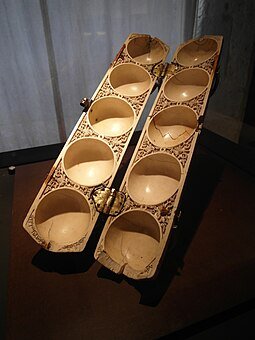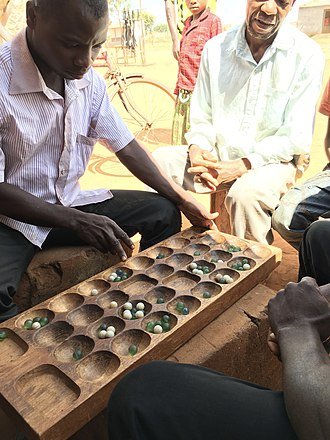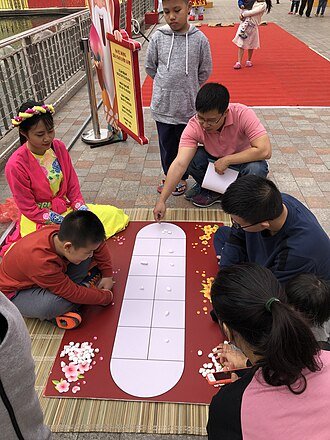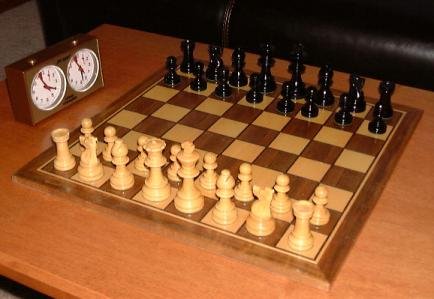GET YOUR GAME ON AT MACKIN HOUSE
Games have been around for thousands of years and while opinions vary, many say that the earliest games were carved into stones, dating back to almost 8000 years ago. These rocks were used as boards to play Mancala, one of history’s oldest games still being played today.
Gebeta (Mancala) holes from the Late Antiquity or early Medieval period in Aksum, Ethiopia. From the English Wikipedia article Mancala.
Versions of the game are played around the world and continue to be popular in African, Caribbean, Middle Eastern, South Asian, and Southeast Asian communities. Many variations of the game exist, but they all consist of players taking turns moving beads around the board. In ancient versions, seeds may have been used as beads in a carved stone board. Modern boards are made from a wide range of materials and make use of many kinds of beads, such as marbles, beans, stones and more. While rules vary, most Mancala games operate on the principle of seeding. One section of pieces is picked up and placed clockwise around the board. The goal is to capture the most pieces in each player’s store, located on the ends of the board.
Other games played today also have ancient origins such as Chess, which is arguably the world’s most popular board game. It has roots in India where many games on a square grid have been played for thousands of years. Chess is thought to trace back to a game called Chaturanga. The exact rules of this game have been lost to time though some aspects of Chaturanga are still incorporated in chess today. The objective of achieving a checkmate on the opponent’s king, for example, remains the same. Chess is thought to have entered Europe through Muslim Spain after spreading through the Islamic world where it gained immense popularity. In Europe, the rules were standardized to be what we consider Chess today around the1500s.
While many games with ancient origins remain popular today, new genres of games are routinely being created. Perhaps one of today’s most popular types of game is the social deduction game. The first game that widely spread in the genre was Mafia, developed by Dmitry Davidoff in 1986, to help teach psychology to high school students after having noticed they were bored with traditional lectures. Mafia is the simplest form of social deduction, with an informed minority working to eliminate members of an uninformed majority whose goal is to seek out and eliminate the traitorous players. The original version of the game spread rapidly though the USSR, being played at schools and summer camps. More complex versions were soon created, such as Werewolf, designed by Andrew Plotkin, who is credited for adding additional roles beyond the original binary.
Social deduction games lend themselves extremely well to digitization, giving the ability to play with strangers or friends from across the world. Town of Salem and Trouble in Terrorist Town are seen as some of the original digital versions of social deduction games. The genre exploded in 2018 with the release of Among Us becoming immensely popular. Among Us further iterates the genre by giving the uninformed majority, tasks to complete around the play area, in addition to their goal of revealing the imposters.
Source: www.ign.com/wikis/among-us/How_To_Play
Social deduction games, particularly simpler versions, have become the subject of many studies. Researchers have worked hard to model these games and understand the chances that different groups of players have at winning. These are notoriously difficult to simulate, given the very human element of deceit present in these games. More recently, artificial intelligence have been used in these research projects, as optimal strategies are being tested and modeled.
Visit us at Mackin House from February 1 – 29 to see our mini exhibit, Get Your Game On, to learn more about the history of games. Come by with friends on February 1 from 2 – 8pm to celebrate the opening of the exhibit and play different games in our parlour. Feel free to bring along any game you would like to share.








